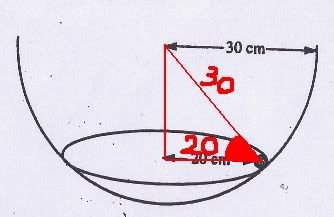Math Is Fun Forum
You are not logged in.
- Topics: Active | Unanswered
Pages: 1
#1 2006-06-17 01:08:05
- Jaswahhihi
- Member

- Registered: 2005-07-23
- Posts: 11
Offline
#2 2006-06-17 05:01:20
- John E. Franklin
- Member

- Registered: 2005-08-29
- Posts: 3,588
Re: M2 QUESTION - HELP Exam on Monday!
I think you gave us the link to the thumbnail, which is too small to read.
After you upload an image to imageshack, there are various sizes you can link to I think.
I usually choose direct link to image.
igloo myrtilles fourmis
Offline
#3 2006-06-17 06:51:55
- Ricky
- Moderator

- Registered: 2005-12-04
- Posts: 3,791
Re: M2 QUESTION - HELP Exam on Monday!
The question doesn't seem to make any sense to me. How is the bowl making the marble move? Is there gravity in this?
"In the real world, this would be a problem. But in mathematics, we can just define a place where this problem doesn't exist. So we'll go ahead and do that now..."
Offline
#4 2006-06-17 07:47:09
- Jaswahhihi
- Member

- Registered: 2005-07-23
- Posts: 11
Re: M2 QUESTION - HELP Exam on Monday!
@John:
Nope the links working John, mabey its just need to load? Ill put another at the bottom of this post though.
@Ricky:
Its really a question about circular motion so you just forget about whats powering the ball. Just say its magnetism or something. And yes, gravity is involved.
The missing link im looking for is the angle which the Reaction force makes with the horizontal. With that im sorted.
I set off resolving forces around the reaction force and equating them to the weight and so on.
Gets horrible........
Last edited by Jaswahhihi (2006-06-17 07:52:04)
98% of the teenage population does or has tried smoking pot. If you're one of the 2% who hasn't, copy & paste this into your signature.
Offline
#5 2006-06-17 10:06:13
- Zhylliolom
- Real Member

- Registered: 2005-09-05
- Posts: 412
Re: M2 QUESTION - HELP Exam on Monday!

If you wish to find the indicated angle in this diagram, it is arccos(20/30). The hypotenuse is 30 because the problem tells us that the bowl is a hemisphere, so the distance from the center to any point on the surface of the bowl is simply the radius, 30. Hopefully this is the mentioned angle you needed to solve the problem, if you need more pieces of the puzzle, just ask.
Offline
#6 2006-06-17 13:51:27
- Ricky
- Moderator

- Registered: 2005-12-04
- Posts: 3,791
Re: M2 QUESTION - HELP Exam on Monday!
The missing link im looking for is the angle which the Reaction force makes with the horizontal. With that im sorted.
Right, this is what I'm not understand. For any positive angle, there exists a force in which the marble will stay the same height. But that's only when there is friction. That's my second problem.
In a frictionless enviornment, applying a constant positive force will constantly accelerate an object. Thus, if the force is always acting on the marble, the marble will be at a different velocity at any point in time. So asking the speed is meaningless.
"In the real world, this would be a problem. But in mathematics, we can just define a place where this problem doesn't exist. So we'll go ahead and do that now..."
Offline
#7 2006-06-17 17:25:40
- Zhylliolom
- Real Member

- Registered: 2005-09-05
- Posts: 412
Re: M2 QUESTION - HELP Exam on Monday!
In a frictionless enviornment, applying a constant positive force will constantly accelerate an object. Thus, if the force is always acting on the marble, the marble will be at a different velocity at any point in time. So asking the speed is meaningless.
The marble is undergoing uniform circular motion, so the force is centripetal and thus the resulting velocity change is only directional. The magnitude of the velocity vector (the speed), which the problem asks for, remains constant.
Offline
#8 2006-06-18 02:02:41
- Jaswahhihi
- Member

- Registered: 2005-07-23
- Posts: 11
Re: M2 QUESTION - HELP Exam on Monday!
If you wish to find the indicated angle in this diagram, it is arccos(20/30). The hypotenuse is 30 because the problem tells us that the bowl is a hemisphere, so the distance from the center to any point on the surface of the bowl is simply the radius, 30. Hopefully this is the mentioned angle you needed to solve the problem, if you need more pieces of the puzzle, just ask.
Thats it mate!!
Thanks v much!
Last edited by Jaswahhihi (2006-06-18 02:03:13)
98% of the teenage population does or has tried smoking pot. If you're one of the 2% who hasn't, copy & paste this into your signature.
Offline
Pages: 1

